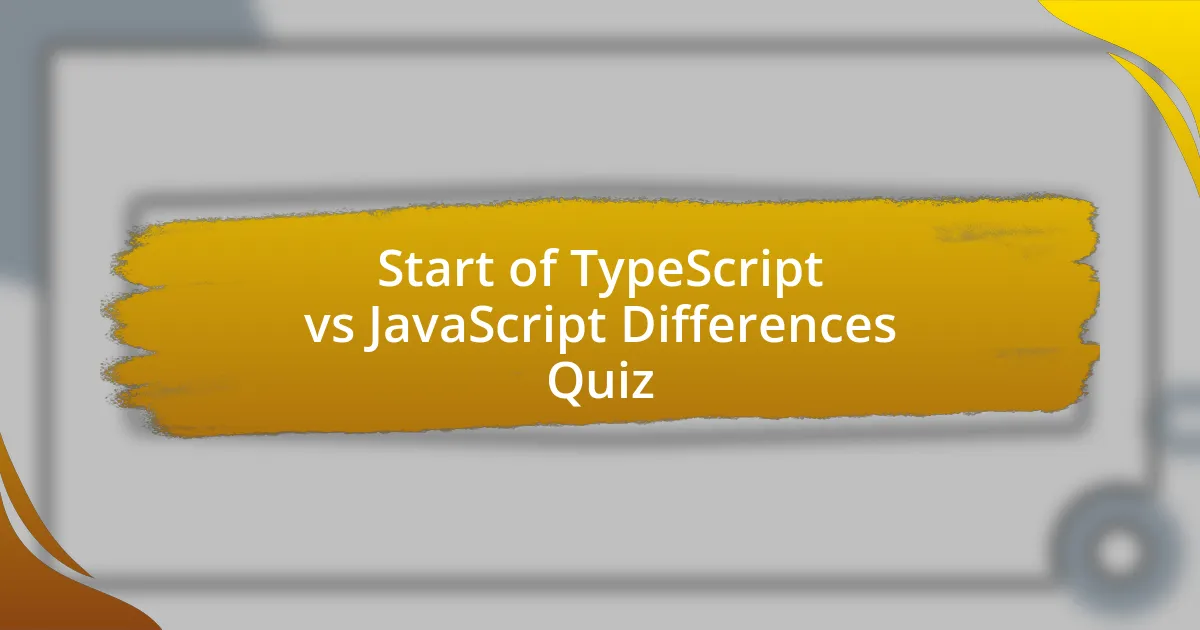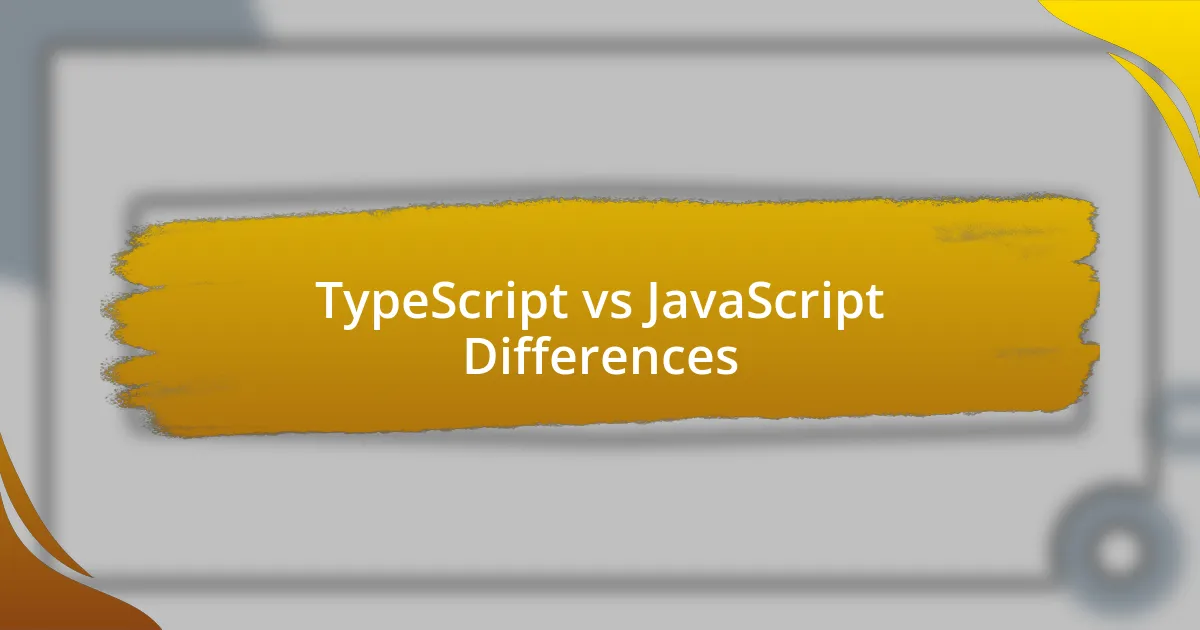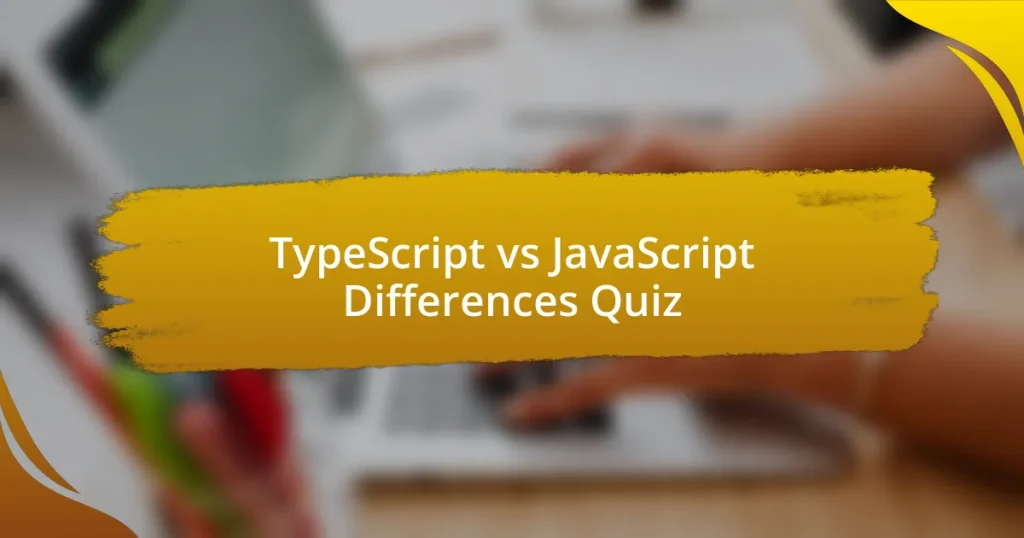
Start of TypeScript vs JavaScript Differences Quiz
1. What is the primary difference between JavaScript and TypeScript?
- JavaScript is dynamically typed, while TypeScript is statically typed.
- JavaScript supports only procedural programming, while TypeScript does not.
- JavaScript cannot define variable types, while TypeScript can.
- JavaScript is a superset of TypeScript but not vice versa.
2. How does TypeScript handle variable types?
- TypeScript does not support variable types at all.
- TypeScript only uses string types for all variables.
- TypeScript allows explicit type declaration for variables.
- TypeScript automatically infers all variable types dynamically.
3. What happens if you try to assign a number to a variable declared as a string in JavaScript?
- It leads to loss of data type
- You can assign a number without issues
- The variable will change to an object
- It causes a runtime error
4. What happens if you try to assign a number to a variable declared as a string in TypeScript?
- Value is automatically converted
- System crashes during execution
- Code runs without issue
- Compile-time error occurs
5. What is the purpose of interfaces in TypeScript?
- Interfaces in TypeScript are used to create pure functions only.
- Interfaces in TypeScript are limited to class inheritance only.
- Interfaces in TypeScript only allow numeric properties in objects.
- Interfaces in TypeScript allow developers to define object structures and types.
6. How does TypeScript`s type system compare to JavaScript`s?
- TypeScript`s type system is static, meaning it checks for type compatibility at compile time, while JavaScript`s is dynamic, checking types at runtime.
- TypeScript`s type system does not require type declarations unlike JavaScript.
- TypeScript allows only dynamic typing, similar to JavaScript.
- TypeScript`s type system behaves like JavaScript`s type checking at runtime only.
7. Can you write vanilla JavaScript within a TypeScript file?
- No, TypeScript requires all code to be strictly typed.
- Yes, you can write vanilla JavaScript within a TypeScript file.
- Yes, but only in specific sections of the file.
- No, you cannot write JavaScript in TypeScript files.
8. What is the compilation process for TypeScript?
- TypeScript automatically converts to Python code for execution.
- TypeScript code needs to be compiled into plain JavaScript using the TypeScript compiler (`tsc`) before it can run.
- TypeScript requires manual conversion to C++ before execution.
- TypeScript code runs directly in the browser without compilation.
9. What is the role of `tsconfig.json` in the TypeScript compilation process?
- `tsconfig.json` is a configuration file for IDE settings.
- `tsconfig.json` contains documentation for TypeScript features.
- `tsconfig.json` manages dependencies for TypeScript projects.
- `tsconfig.json` specifies compiler options for the TypeScript compiler.
10. How does TypeScript`s static typing impact code maintainability?
- TypeScript`s static typing reduces the amount of code written, but does not enhance maintainability.
- TypeScript`s static typing makes it harder to read code because of excessive type declarations.
- TypeScript`s static typing improves code maintainability by catching type-related errors early and providing better autocomplete and validation tools.
- TypeScript`s static typing has no effect on code maintainability; it focuses only on performance.
11. What are some additional features of TypeScript beyond static typing?
- Generics
- Syntax highlighting
- Inline CSS
- Automatic caching
12. How does TypeScript`s compilation process affect runtime performance?
- TypeScript`s compilation adds a large amount of bloat, drastically slowing down runtime performance.
- The compilation process can introduce small runtime overhead, but performance differences are often negligible for most applications.
- The compilation process eliminates all runtime errors completely and enhances performance significantly.
- The compilation process affects runtime performance by changing how code executes in the browser engine.
13. Can JavaScript be transcompiled like TypeScript?
- Yes, JavaScript can be transcompiled like TypeScript.
- Maybe, JavaScript is transcompiled with specific tools.
- Occasionally, JavaScript can be transcompiled using TypeScript.
- No, JavaScript cannot be transcompiled like TypeScript.
14. What is the learning curve for TypeScript compared to JavaScript?
- The learning curve for TypeScript is identical to JavaScript as they are the same language.
- The learning curve for TypeScript is easier because it shares JavaScript syntax.
- The learning curve for TypeScript is non-existent since it is just an extension of JavaScript.
- The learning curve for TypeScript is slightly steeper due to the need to learn types and interfaces.
15. How does TypeScript`s type system impact error checking?
- TypeScript ignores type-related errors completely.
- TypeScript checks errors at runtime only.
- TypeScript allows for compile-time error checking.
- TypeScript runs code without any error checking.
16. What is the impact of TypeScript`s type system on code quality and understandability?
- TypeScript`s type system has no significant impact on code quality or maintainability.
- TypeScript`s type system primarily focuses on enhancing runtime performance over code readability.
- TypeScript`s type system complicates the codebase and reduces understandability for new developers.
- TypeScript`s type system enhances code quality and understandability by providing explicit type declarations and preventing unexpected type changes.
17. Can you define complex data types like arrays and objects in TypeScript?
- Yes, but complex data types are not useful in TypeScript.
- No, TypeScript only supports primitive data types and not complex ones.
- Yes, you can define complex data types like arrays and objects in TypeScript using interfaces and type annotations.
- Yes, but only arrays can be defined, not objects in TypeScript.
18. How does TypeScript support modern JavaScript features like classes and inheritance?
- TypeScript does not support modern JavaScript features like classes at all.
- TypeScript only allows classes to be defined in plain JavaScript without any enhancements.
- TypeScript supports classes and inheritance with access modifiers and abstract classes.
- TypeScript uses only functional programming without support for classes or inheritance.
19. What is the role of namespaces in TypeScript?
- Namespaces in TypeScript enforce strict syntax rules for functions.
- Namespaces in TypeScript manage asynchronous code execution.
- Namespaces in TypeScript are used to create global variables.
- Namespaces in TypeScript help modularize and organize components, which is not supported in JavaScript.
20. How does TypeScript`s type inference feature work?
- TypeScript`s type inference feature is irrelevant to the code compilation process.
- TypeScript only supports type inference for primitive data types like numbers and strings.
- TypeScript`s type inference feature allows the compiler to automatically determine the types of variables and function parameters based on their usage.
- TypeScript requires developers to declare all variable types explicitly before using them.
21. Can you write more code in JavaScript compared to TypeScript?
- Yes, TypeScript is more flexible, enabling larger codebases without limits.
- No, TypeScript allows more extensive coding capabilities due to its features.
- Yes, you can write more code in JavaScript because it does not enforce strict type annotations.
- No, JavaScript has more restrictions on code size compared to TypeScript.
22. How does TypeScript`s compilation process affect the size of emitted JavaScript?
- The emitted JavaScript from TypeScript cannot be larger than handwritten JavaScript.
- The emitted JavaScript from TypeScript could be larger due to added features.
- The emitted JavaScript from TypeScript is always smaller than normal JavaScript.
- The emitted JavaScript has no size changes regardless of TypeScript.
23. What is the impact of TypeScript`s type system on runtime performance?
- TypeScript performs significantly better than JavaScript.
- TypeScript causes a major decrease in runtime performance.
- TypeScript has no effect on runtime performance whatsoever.
- The runtime performance of TypeScript is similar to JavaScript.
24. Can you define named constants in TypeScript?
- No, you cannot define named constants in TypeScript.
- Yes, you can define named constants in TypeScript using enums.
- Yes, you can define named constants only within classes in TypeScript.
- Yes, named constants are defined with functions in TypeScript.
25. How does TypeScript`s type system impact collaboration among developers?
- TypeScript`s type system has no impact on collaboration among developers.
- TypeScript`s type system improves collaboration by providing clear and explicit type declarations.
- TypeScript`s type system reduces collaboration by limiting team member code contributions.
- TypeScript`s type system complicates collaboration by enforcing strict coding standards.
26. What is the role of decorators in TypeScript?
- Decorators in TypeScript are used to create user interfaces and design layouts.
- Decorators in TypeScript allow developers to annotate code with additional metadata for features like dependency injection.
- Decorators handle errors during runtime by wrapping functions with additional checks.
- Decorators serve as a method to enforce variable scopes and access modifiers.
27. Can you modularize components in JavaScript?
- JavaScript can only use global variables.
- No, JavaScript cannot modularize components.
- JavaScript lacks any form of code organization.
- Yes, you can modularize components in JavaScript.
28. How does TypeScript`s type system impact the overall development experience?
- TypeScript`s type system has no impact on collaboration among developers.
- TypeScript`s type system makes debugging more complex and time-consuming.
- TypeScript`s type system reduces the need for comments and documentation in code.
- TypeScript`s type system improves the overall development experience by providing better autocomplete, validation, and refactoring capabilities.
29. What is the impact of TypeScript`s static typing on the risk of runtime errors?
- TypeScript`s static typing reduces the risk of runtime errors by catching type-related errors at compile time.
- TypeScript`s static typing increases the risk of runtime errors by adding complexity.
- TypeScript`s static typing has no effect on runtime errors; they occur at runtime only.
- TypeScript`s static typing eliminates all runtime errors, regardless of code quality.
30. How does TypeScript`s compilation process affect the development workflow?
- The compilation step simplifies the code, making it cleaner and shorter than JavaScript.
- TypeScript`s compilation process automatically converts all JavaScript code to TypeScript.
- TypeScript`s compilation process eliminates all types of errors during runtime.
- The compilation process in TypeScript adds a build step, which requires configuring a `tsconfig.json` file to specify compiler options.

Quiz Completed: Congratulations!
Thank you for participating in the quiz on the differences between TypeScript and JavaScript! We hope you found the questions engaging and illuminating. This quiz was designed not just to test your knowledge but also to enhance your understanding of these two pivotal programming languages. Being aware of their key differences can greatly influence your development choices and improve your coding practices.
Throughout the quiz, you may have discovered how TypeScript offers static typing, which can catch errors early in the development process. You may have also learned about the advantages of using interfaces and the benefits of better tooling with TypeScript. JavaScript retains its flexibility and is vital for dynamic web applications. Recognizing when to use each language can make a significant impact on your projects.
We encourage you to check out the next section on this page, which delves deeper into the ‘TypeScript vs JavaScript Differences’. There, you’ll find detailed explanations, examples, and resources that can further expand your understanding. Continue your journey in mastering these languages and elevate your programming skills!

TypeScript vs JavaScript Differences
Overview of TypeScript and JavaScript
TypeScript and JavaScript are programming languages used primarily for web development. JavaScript is a dynamic, interpreted language that is widely supported across browsers. It is essential for adding interactivity to web pages. TypeScript, on the other hand, is a superset of JavaScript. It adds optional static typing and other features that enhance development experience. Both languages can be used together, but TypeScript offers additional tools for managing larger codebases.
Static vs Dynamic Typing
The key difference between TypeScript and JavaScript lies in their typing systems. JavaScript is dynamically typed, meaning variable types can change at runtime. This flexibility can lead to runtime errors that are hard to debug. TypeScript introduces static typing, which allows developers to define variable types at design time. This feature helps catch errors during development, resulting in more predictable and maintainable code.
Compilation Process
JavaScript is interpreted directly by web browsers, allowing for immediate execution of code. TypeScript requires a compilation step, where TypeScript code is transpiled into JavaScript. This process converts TypeScript’s syntax and types into standard JavaScript that can be executed by browsers. The compilation provides additional error checking and optimization opportunities before code runs.
Tooling and IDE Support
TypeScript provides enhanced tooling compared to JavaScript. Many integrated development environments (IDEs) and text editors offer better syntax highlighting, code completion, and error detection for TypeScript. This is largely due to its static typing and structure, which allows tools to understand the code more effectively. Developers often find that TypeScript improves their productivity and reduces coding errors.
Object-Oriented Programming Features
TypeScript has built-in support for object-oriented programming (OOP) paradigms, such as classes and interfaces. While JavaScript also allows for OOP through prototypes, it lacks formal structures for defining classes and interfaces until ECMAScript 6 (ES6). TypeScript’s OOP features enable developers to create more structured and modular code, making it easier to organize complex applications and promote code reuse.
What are the main differences between TypeScript and JavaScript?
The main differences between TypeScript and JavaScript include type systems, syntax features, and tooling support. TypeScript is a superset of JavaScript, which means all JavaScript code is valid TypeScript code. However, TypeScript introduces static typing, which allows developers to specify variable types, enhancing code quality and readability. Additionally, TypeScript supports modern JavaScript features and provides advanced tooling options such as autocompletion and error checking during development.
How does TypeScript improve code quality compared to JavaScript?
TypeScript improves code quality primarily through its static typing system. This feature allows developers to catch errors at compile-time rather than runtime. By explicitly defining types, TypeScript helps prevent type-related errors and facilitates clearer documentation of code structures. According to a study by the International Journal of Software Engineering, TypeScript can reduce runtime errors by 15% or more, enhancing overall code reliability.
Where can you use TypeScript instead of JavaScript?
TypeScript can be used in any environment where JavaScript is used, including web development frameworks like Angular, React, and Node.js. Many developers choose TypeScript for large-scale applications where maintainability is crucial. TypeScript is also commonly utilized in environments that support modern front-end development practices and can seamlessly integrate with existing JavaScript projects.
When should you choose TypeScript over JavaScript?
You should choose TypeScript over JavaScript when you’re working on large codebases that require maintainability and scalability. If your project involves multiple developers or has complex features, TypeScript’s type-checking capabilities can significantly reduce bugs and improve collaboration. Additionally, for projects that anticipate future growth or changes, TypeScript provides a structured approach that can adapt more easily than plain JavaScript.
Who typically prefers to use TypeScript over JavaScript?
Developers who work on large-scale applications, enterprise-level projects, or teams engaging in extensive codebases typically prefer TypeScript over JavaScript. Teams that value maintainability, early error detection, and clear code documentation find TypeScript beneficial. Additionally, developers familiar with strongly-typed languages, like Java or C#, may also lean towards TypeScript due to its similar typing system.
















